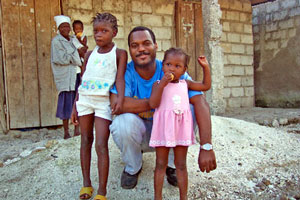
Calherbe Muhammad was sent to the United States some 17 years ago by his family to attain an education to help him return one day to be a help to his people.
He joined the Nation of Islam in New York City and after moving to Virginia Beach, Va. several years ago and completing his formal education, founded the organization Christians United for Haiti. “Haitians need so many resources today, because of years of neglect particularly by the U.S.,” he told The Final Call.
This energetic young man returns often to his beloved Haiti to help pastors in their work of assisting people in these troubled times.
“We are paying for 50 pastors to go to school, and our objective is to teach leaders on the ground strategic thinking and analysis,” Mr. Muhammad said. “It is very important that we empower Haitian communities to use what they already have. Everyone sits around waiting for the IMF, World Bank and the United Nations for help, which never comes,” he added.
When you ask the pastors what is the most pressing need of parishioners, they say “drinking water and schools,” he continued.
“Then they say to me, who is going to help us. We know we need to pray, and we are waiting for God to send us a sign. We need help.”
Mr. Muhammad returned from Haiti a few days ahead of the recent turmoil. “Everybody is begging on the streets. The people say they have a burning in their stomachs from the hunger, in Creole it is ‘grangou klorox,’ or I have a bleaching hunger,” he explained. And, the worst part is that the elite go shopping in the Dominican Republic, while the poor cannot afford to buy toothpaste or soap, Mr. Muhammad said.
In January, Haitiaction.net reported, “The few families of Haiti’s traditional elite continue to exact exorbitant profits, while residents of Cite Soleil are forced to eat mud pies and bathe in ditches.” Cite Soleil is a sprawling shanty town that is home to more than 300,000 people who continue to live in abject poverty, according to Haitiaction.net.
“I wouldn’t say they are forced to eat the mud cakes, but it has been a way for them to stem the hunger,” Mr. Muhammad said. The Associated Press in a January story, said, “The mud has long been prized by pregnant women and children here as an added source of calcium. But in places like Cite Soleil, cookies made of dirt, salt and vegetable shortening have become a regular meal.”
The UN World Food Program reports that the price of rice, a Haitian staple, has doubled from $35 to $70 for a 120 pound sack. “When the bird flu hit the Dominican Republic last year, the price of eggs and chickens went sky high, which devastated Haiti, because Haitians no longer have the ability to raise their own chickens,” Mr. Muhammad said. “They have just stopped producing anything.”
Mr. Muhammad said he talked to his father on April 8. “He told me that things were really bad in the streets, and that he couldn’t leave his house, because people were burning cars and tires,” Mr. Muhammad said.
“The problem is that Haitians need to learn to solve problems through dialogue. We cannot continue to use violence to bring about political change.”












